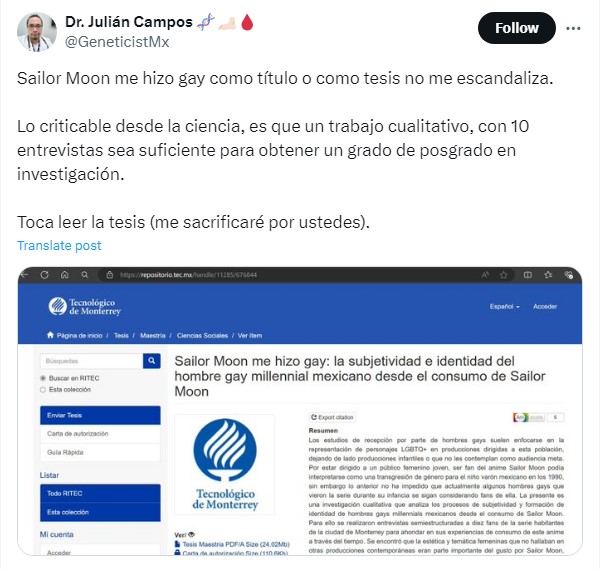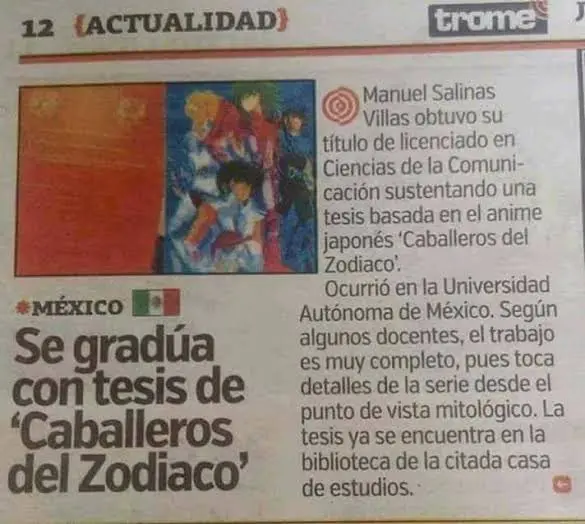Academic Thesis: “Sailor Moon Made Me Gay” Goes Viral Online

A university study went viral in Mexico for its theme, “Sailor Moon Made Me Gay,” sparking controversy and criticism for being deemed “frivolous” and using public funds for what many see as a non-urgent topic.
Written by Daniel Eugenio Salinas Lara, the thesis is part of his studies to obtain a master’s degree in Humanistic Studies at the Monterrey Institute of Technology. The backlash attracted significant attention.
Academic Thesis: “Sailor Moon Made Me Gay” Goes Viral Online
Daniel Eugenio’s thesis is described as follows: “Studies on gay men’s media reception usually focus on LGBTQ+ character representation in productions targeted at this audience, overlooking children’s shows or productions that do not consider them the target audience.

Since Sailor Moon was aimed at a young female audience, being a fan of the anime could be interpreted as a gender transgression for Mexican boys in the 1990s. However, this did not stop some gay men who watched the show during childhood from continuing to consider themselves fans today.
This study is a qualitative investigation that examines the processes of subjectivity and identity formation of Mexican gay millennials through the consumption of Sailor Moon. Semi-structured interviews were conducted with ten fans living in Monterrey to explore their experiences with this anime over time.
The research found that the feminine aesthetics and themes, absent in other contemporary productions, were important factors in the interest in Sailor Moon. These elements sparked enjoyment or identification due to their departure from hegemonic masculinity with which these individuals did not identify.

Although initially this consumption experience was cautious, in adulthood, the affection for the series is recontextualized and claimed as part of millennial gay identity and the acceptance of gay femininity. These findings contribute to the understanding of gay subjectivity and media consumption beyond traditional LGBTQ+ representation.”
Criticism of the Research
One of the most criticized aspects of the thesis is the fact that the author interviewed only 10 people, which is considered a small sample size for this type of study.
Naturally, anime fans did not hold back. Some recalled that similar academic works had already been done in Mexico, such as the famous study on Saint Seiya, which even made headlines back in the day.

For those interested in reading the full thesis (in Spanish), [click here]. Below are some of the most popular reactions:
- “What madness! And here I was thinking that Sailor Mars was my first girlfriend.”
- “Not to belittle the specialty, but… HAHAHAHAHAHA! What did you expect from Humanities? HAHAHAHAHAHA!”
- “I read a bit of the thesis, and a lot of it seems taken from Wikipedia. I guess the standards in Humanities aren’t that high.”
- “I gathered 10 friends to push my narrative as if it were anything: The thesis.”
- “Calm down. When I did my thesis on Grindr, everyone laughed, and it still made it. The first investigation is there to be developed, without prejudice. I await your analysis.”
- “The complete state of our future ‘scientists’ in Mexico.”
- “Out of morbid curiosity, I want to read the thesis and feel even worse for everything I’ve denied until now.”
- “If you don’t want to write a thesis, find another way to graduate.”
- “A thesis on how theses are basically institutionalized Wattpad projects.”
- “So, can I change my thesis to how the Tokyo Expedition arc of Haikyuu is an antidepressant?”
via Twitter



